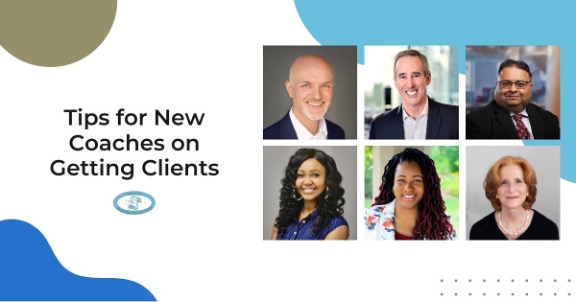If a new coach wants clients, what do you recommend they do?
To help new coaches secure clients, we asked experienced coaches and business leaders this question for their best ideas. From developing your value proposition to creating short-form content for free, there are several strategies that may help new coaches get and retain their first clients.

Here are 11 tips for new coaches on getting clients:
- Develop Your Value Proposition
- Build That “Know, Like and Trust” Factor
- Talk about Them, not Yourself
- Be Clear and Resilient
- Don’t Be Too Picky
- Choose a Niche
- Select a Consistent Approach
- Coach, Don’t Sell
- Find Your What, Who and Why
- Tailor Marketing Efforts
- Create Short-form Content for Free
Develop Your Value Proposition
The foundation of all your marketing activities is an authentic value proposition. Your value proposition is derived from the intersection of three factors: your strengths as a coach, what your target clients value and the potential weaknesses of other coaches you’ll be competing with. Your value proposition expresses your promise to your target clients and answers the most basic question: why you?
Once you’ve settled on your promise and 1–2 points of distinction, you’ll want to carefully define the key elements of your value proposition, provide proof points and create an elevator pitch. Whether it’s writing copy for your website, composing email newsletters, exploring engagements with clients, presenting to your local rotary club or chamber of commerce or promoting your brand across media, you’ll want to consistently employ your value proposition and align it, when possible, with what your prospective client values.
- David Ehrenthal, Coach at Mach10 Career and Leadership Coaching
Build That “Know, Like and Trust” Factor
Be focused on what problem you want to help your potential clients solve. Get to know your audience and learn as much about them as possible. Learn who they are, what they do, their background, age, successes, and challenges. Let that inform how you create your content; be a resource that can address or solve a particular problem your clients are struggling with daily. This will help you build that “know, like, and trust” factor, and clients will start coming to you to learn more about how you can help them as their coach.
- John Neral, Owner of John Neral Coaching, LLC
Talk about Them, not Yourself
Consider sharing a story, with your coaching prospect as the hero and you in the role of guide. Paint a picture of their upcoming trials, experiments, accomplishments, and positive outcomes. Then, listen. Then, get them talking. It’s best if they make a discovery or two about how working with you will benefit them. Do this, and you will get a faster close and a more authentic start to the relationship.
- Mike Wittenstein, Managing Partner of Storyminers
Be Clear and Resilient
First, the coach must be clear about who their ideal client is. They need to understand why the client is hiring them as a coach, and what they can do to help clients be more successful than they are.
Second, the coach must be willing to Learn about clients’ aspirations, desires, pain points and the benefits they will receive if they get coached.
Third, the coach must be clear about the Engagement model. Is it hourly coaching or a coaching program, and what can they do to accommodate client needs?
Fourth, the coach must be able to Adapt continuously to evolutions and changes. They must keep experimenting and learn what is working and what needs to change.
Finally, the Coach needs to be resilient and not get disheartened by failure, by demonstrating the courage to confront reality and bounce back from siad failures.
- Pritesh Shah, President, https://www.linkedin.com/in/priteshvshah
Don’t Be Too Picky
Many people get into businesses like coaching under the misleading impression that every moment of every client engagement will be the most wonderful, fulfilling, perfectly aligned experience of their lives. While sometimes that is true for the coach and client, there are a couple of things you need upfront before you can reasonably expect that to happen.
I’ve been coaching for 35 years. I was pretty hit-and-miss at first. I did the hard work and the tedious work, and even got a graduate certificate in evidence-based coaching. Today, many people say I’m the best in my field. Whether that’s the case or not, I know I’m a lot better than I was in 1987, because I have a lot more experience that helped me develop my skills.
- David Garfinkel, Coach at Garfinkel Coaching
Choose a Niche
I highly recommend choosing a niche right out the gate. Why? Because choosing a target audience allows you to quickly master and understand your ideal client’s pain points, needs and desires. A well-defined niche allows you to create content that speaks directly to your people, which in turn will help you attract more people in that field. This strategy will also help you with finding and showing up in places where you know your ideal client is. You can also end up building a reputation for being the go-to expert for a specific field.
- Chelsea Jay, Executive Leadership Coach at Chelsea Jay Consulting
Select a Consistent Approach
To successfully find clients, you need to first identify how you are most likely to naturally find clients. Your natural preferences are important, because while you may be willing to try something that doesn’t feel natural once or twice, it is going to be hard to sustain over time. And finding clients is a marathon, not a sprint.
For an extroverted person, the best way to find clients might be by sharing their coaching story with a lot of people. For someone who loves to be online, social media might be the right choice. For a writer, they might publish a blog or write on Medium.
Choose the best way for you, and then learn everything you can about how to optimize results on the path that you have chosen. Good luck!
- Rachel Simeone, President of Rachel Simeone, LLC
Coach, Don’t Sell
I never talk to a client about what I do. From the minute we interact, my goal is for them to receive value from a conversation with me— whether or not they hire me isn’t the main goal. I skip introductions by connecting with Linkedin ahead of time, and then quickly go as deep as possible by pointing out issues and contradictions as if I was coaching the person. At the end, I offer to talk a little about how I work, but I stay at a very high level.
- Xavier Naville, CEO and Leadership Teams Coach
Find Your What, Who and Why
Take a really good look at what you could train on or discuss for hours without needing preparation. Look at an older version of you, and what guidance they would have benefitted from. Your answers will guide you to your target audience, what your niche is and what topics you can position yourself as an authority on. This will help you reach your next client.
- Indya Clark, Executive Resilience & Mindset Coach at Resilient Wings LLC
Tailor Marketing Efforts
Get new clients the same way businesses get new customers—through tailored brand messaging. When potential clients view your social media or website pages, they should be able to understand from a glance what your coaching will do for them, such as help with a career transition or financial decisions. Advertise based on the niche services that you offer.
- Breanne Millette, CEO of BISOULOVELY
Create Short-form Content for Free
Everybody loves free stuff that doesn’t cost too much time!
People often forget how effective short-form content can be. If you are a new coach who wants to gain clients, you need to start making some short content for social media platforms, and give them away for free. Once you get some attraction and have a decent following, start promoting your paid plans. Even if you don’t make any sales for the content you made earlier for free, those contents will produce organic reach that would have cost way more if you started off with a paid plan or traditional marketing campaign.
- Mike Albrecht, Marketing Specialist at Fresha
Terkel creates community-driven content featuring expert insights. Sign up at terkel.io to answer questions and get published.




